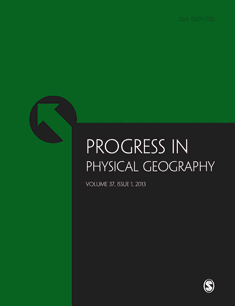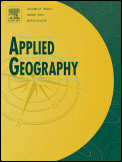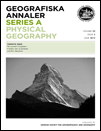
Progress in Physical Geography-Earth and Environment
Scope & Guideline
Shaping understanding of our planet's complexities.
Introduction
Aims and Scopes
- Hydrological and Geomorphological Studies:
This area emphasizes the analysis of water systems, sediment transport, and landform evolution, employing both field studies and remote sensing technologies to understand surface processes. - Urban and Environmental Dynamics:
Research in this scope explores the interactions between urban development and environmental changes, including studies on urban heat islands, land use changes, and ecosystem services. - Climate Change Impacts and Adaptation:
The journal publishes studies that assess the effects of climate change on various ecosystems, with a focus on adaptation strategies and mitigation measures in different geographical contexts. - Biodiversity and Ecosystem Services:
This encompasses research on the relationship between biodiversity and ecosystem functions, aiming to provide insights into conservation strategies and sustainable management of natural resources. - Technological Innovations in Geography:
The application of advanced technologies such as remote sensing, GIS, and machine learning in physical geography research is a key focus, enhancing data collection and analysis capabilities.
Trending and Emerging
- Remote Sensing and Data Integration:
There is a significant increase in studies utilizing remote sensing technologies and integrating various data sources to analyze environmental changes, indicating a trend towards data-driven research methodologies. - Climate Resilience and Sustainability:
Research focused on climate resilience strategies and sustainable practices is trending, highlighting the importance of adapting to climate change impacts on ecosystems and human societies. - Anthropogenic Influences on Natural Systems:
Increasing attention is being paid to the impacts of human activities on natural systems, including pollution, land use changes, and resource management, reflecting a broader concern for environmental justice and sustainability. - Interdisciplinary Approaches to Environmental Research:
Emerging themes show a trend towards interdisciplinary collaboration, combining insights from ecology, sociology, economics, and geography to address complex environmental issues. - Ecosystem Services Valuation:
There is a growing focus on quantifying and valuing ecosystem services, which is critical for informing policy and promoting sustainable management practices.
Declining or Waning
- Traditional Geomorphological Studies:
While geomorphology remains important, the focus has shifted from purely descriptive studies of landforms to integrative approaches that connect geomorphology with ecological and hydrological processes. - Static Environmental Assessments:
There is a noticeable decline in studies that provide static assessments of environmental conditions without considering dynamic interactions and changes over time, as the field moves towards more integrative and process-oriented research. - Localized Case Studies:
Research that focuses exclusively on localized case studies with limited applicability or scalability is becoming less common, as there is a growing emphasis on broader, more generalizable findings that contribute to global knowledge.
Similar Journals

APPLIED GEOGRAPHY
Connecting insights across environmental and socio-economic landscapes.APPLIED GEOGRAPHY, published by Elsevier Science Ltd, stands as a premier journal within the fields of environmental science, geography, planning and development, as well as tourism, leisure, and hospitality management. With an impressive 2023 impact factor that reflects its high citation rates, this journal is ranked Q1 in several categories, underscoring its significance and influence in interdisciplinary research. Covering a broad range of topics from innovative environmental practices to spatial analysis and socio-economic factors affecting tourism, APPLIED GEOGRAPHY promotes insightful discussions and practical applications that are vital for advancing knowledge and practice in these fields. Researchers, professionals, and students will find the journal's rigorous peer-reviewed articles invaluable for staying informed about the latest trends and findings impacting the geospatial landscape. As an essential resource, APPLIED GEOGRAPHY aims to foster interdisciplinary collaborations and inspire scholarly dialogue, making it a cornerstone for those engaged in the study and application of geography across various sectors.

GEOGRAFISKA ANNALER SERIES A-PHYSICAL GEOGRAPHY
Navigating the Terrain of Earth SciencesGeografiska Annaler Series A-Physical Geography, published by Taylor & Francis Ltd, is a leading academic journal dedicated to the advancing field of physical geography. With a rich publication history spanning from 1979 to 2024, this journal stands out in its categories, being positioned in the Q2 quartile for both Geography, Planning and Development and Geology in 2023. The journal is recognized for its contribution to Earth and Planetary Sciences, evidenced by its Scopus rankings placing it in the top 31% and 32% of its respective disciplines. Belonging to a distinguished publisher from the United Kingdom, it provides a vital platform for researchers, professionals, and students to disseminate and engage with cutting-edge research. While the journal does not currently offer open access, it remains a pivotal resource for those involved in the study of physical geography, offering insights that enhance our understanding of the Earth's processes and environments.

Geography and Sustainability
Advancing Knowledge for a Sustainable World.Geography and Sustainability is a prestigious, peer-reviewed journal published by Elsevier, focusing on the interdisciplinary fields of geography, ecology, and environmental science. As an Open Access publication since 2020, it aims to provide a platform for the dissemination of high-quality research that addresses critical sustainability challenges facing our planet. Based in China, the journal navigates through an impressive array of categories, all classified in the Q1 Quartile rankings for 2023, showcasing its top-tier status in areas such as Earth-Surface Processes, Geography, Planning and Development, and Nature and Landscape Conservation. With its notable impact factors—ranked 2nd in Earth and Planetary Sciences and 3rd in Environmental Science—it attracts contributions from leading experts and emerging scholars alike. Researchers, professionals, and students seeking to advance the scientific understanding of sustainability and its geographical implications will find indispensable resources and innovative findings within the pages of this journal.

All Earth
Connecting Research and Policy for a Sustainable TomorrowAll Earth is an esteemed open-access journal published by Taylor & Francis Ltd, dedicated to multidisciplinary research in the fields of Earth and Planetary Sciences, Global and Planetary Change, as well as Management, Monitoring, Policy, and Law. Since its inception in 2021, All Earth has swiftly positioned itself in the academic community, achieving notable rankings such as Q2 in Earth and Planetary Sciences and Q3 in related fields, showcasing its commitment to high-quality interdisciplinary scholarship. Researchers and professionals can benefit from its accessible content, which contributes to the ongoing discourse on critical environmental issues and innovative solutions for sustainable development. The journal is based in the United Kingdom and continues to be a vital source of information and inspiration for students and scholars aiming to tackle the pressing challenges of our planet through rigorous scientific inquiry and policy analysis.

Physio-Geo
Connecting Disciplines, Transforming KnowledgePhysio-Geo (ISSN: 1958-573X) is a distinguished open-access journal published by REVUES ORG, dedicated to advancing the fields of Earth and Planetary Sciences, with a special focus on Earth-Surface Processes, Environmental Science, and Ecology. Since its inception in 2007, Physio-Geo has provided a platform for researchers, professionals, and students to disseminate and access high-quality studies that contribute to the understanding of our environment. With a convergence period from 2019 to 2024, the journal aims to bridge disciplinary gaps and foster interdisciplinary research that addresses pressing ecological and environmental challenges. Despite its current Scopus rankings reflecting an early-stage development, the journal is poised to enhance its impact within the scientific community, particularly as it embraces a wider audience through its open-access model. By offering valuable insights and comprehensive analyses, Physio-Geo is an essential resource for those seeking to explore the complex interactions between physical geography and ecological systems.

Anthropocene Coasts
Championing Global Solutions for Coastal ChallengesAnthropocene Coasts is a pivotal peer-reviewed journal published by SpringerNature, dedicated to advancing the interdisciplinary understanding of coastal systems in the context of the Anthropocene epoch. Since its inception in 2018, the journal has focused on critical issues at the intersection of Nature and Landscape Conservation, Ocean Engineering, Oceanography, and Waste Management and Disposal, achieving an impressive Q2 ranking in all these categories as of 2023. With a country of origin in Canada, this journal not only addresses significant environmental challenges, but also promotes innovative solutions and sustainable practices that resonate globally. Researchers, professionals, and students engaged in marine science, environmental studies, and engineering will find valuable insights and cutting-edge research disseminated through this open-access platform. By fostering collaboration and knowledge-sharing, Anthropocene Coasts empowers its audience to contribute to the sustainable management of coastal environments in an era of rapid change.

Earth Systems and Environment
Championing Research for a Resilient EnvironmentEarth Systems and Environment, published by Springer International Publishing AG, is a leading peer-reviewed journal dedicated to the multidisciplinary study of natural and anthropogenic processes that shape the Earth's systems. With an impressive impact factor and consistently ranked in the Q1 category across various fields, including Computers in Earth Sciences, Economic Geology, and Environmental Science, it stands as a premier platform for researchers and professionals seeking to address pressing environmental challenges. The journal covers a wide spectrum of topics, from geology to global change, and emphasizes innovative methodologies and interdisciplinary approaches to understand and manage Earth systems. As an essential resource for scholars and practitioners, Earth Systems and Environment commits to excellence and facilitates open dialogue on critical issues affecting our planet.

Miscellanea Geographica
Unveiling the Complexity of Our PlanetMiscellanea Geographica, published by SCIENDO, is a prominent open-access journal established in Germany that contributes significantly to the fields of Earth and Planetary Sciences and Geography. With an ISSN of 0867-6046 and an E-ISSN of 2084-6118, this journal has been a platform for scholarly dissemination since 1984, encompassing a diverse range of interdisciplinary research areas. Since transitioning to open access in 2011, it has made its content widely available, enhancing visibility for researchers and practitioners across the globe. In the 2023 category quartiles, Miscellanea Geographica is ranked Q3 in both Earth and Planetary Sciences (miscellaneous) and Geography, Planning and Development, reflecting its commitment to quality scholarship. This journal is specifically designed to foster dialogue and collaboration among researchers, professionals, and students, making it a vital resource for those invested in the intricate relationships between geography and societal development. Researchers are encouraged to contribute groundbreaking studies that not only advance academic understanding but also address real-world challenges.

EARTH is a prestigious journal published by MDPI, located in Switzerland, with a commitment to advancing the fields of Earth and Planetary Sciences and Environmental Science. Launched in 2020, the journal emphasizes an open-access publication model, ensuring that high-quality research is widely accessible to the scientific community and beyond. As of 2023, it proudly holds a Q2 ranking in both the Environmental Science and Earth and Planetary Sciences categories, indicating its significant impact within these disciplines; it ranks #90 out of 219 and #70 out of 159 in their respective fields according to Scopus. With the convergence of multidisciplinary research and the critical challenges our planet faces, EARTH seeks to publish innovative studies that foster a deeper understanding of geological and environmental processes. Researchers, professionals, and students alike will find this journal an invaluable resource for the latest findings and discussions shaping our understanding of Earth sciences.

Journal of Geography-Chigaku Zasshi
Navigating the Terrain of Knowledge in GeographyJournal of Geography - Chigaku Zasshi is a distinguished publication that serves as a crucial platform for the dissemination of research in the realm of geography and earth sciences. Published by the TOKYO GEOGRAPHICAL SOC in Japan, this journal is indexed with an ISSN of 0022-135X and an E-ISSN of 1884-0884. With a scope that includes Earth-Surface Processes, Geography, Planning and Development, Geology, Geophysics, and Global and Planetary Change, it provides comprehensive coverage of pressing geographical issues. Although it holds a Q4 ranking in multiple categories as of 2023, the journal presents an opportunity for researchers, professionals, and students to contribute meaningful findings in a diverse and competitive landscape. The Journal of Geography actively promotes scholarly dialogue by embracing the complexities of our planet and encouraging innovative approaches to geographical inquiries. This open-access journal aspires to bridge gaps and foster collaboration among scholars worldwide, underscoring its importance in understanding and addressing contemporary geographic challenges.